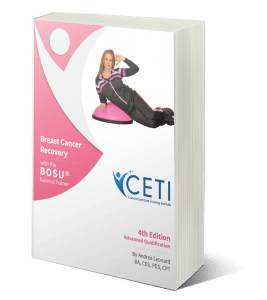 OncoVie™ Breast Cancer Recovery BOSU® Specialist Advanced Qualification
OncoVie™ Breast Cancer Recovery BOSU® Specialist Advanced Qualification
It takes a special person, both empathetic and compassionate, to work with breast cancer patients. One must have a deep understanding of exercise oncology and how to safely and effectively create an exercise program with proper modifications and progressions. The OncoVie™ Breast Cancer Recovery BOSU® Specialist (BCRBS) program will give you the tools and confidence that you need to work safely and effectively with breast cancer patients and survivors at all stages of the recovery journey.
Who is it best suited for?
The BCRBS program was developed for health and fitness professionals seeking to gain a complete understanding of the entire cancer process from diagnosis and treatment to reconstruction and survivorship. This program was designed to help and encourage fitness professionals to attain a higher level of mastery and work with cancer patients during and after cancer surgery and treatment and into survivorship.
How do I earn the BCRBS qualification?
To become an OncoVie™ Breast Cancer Recovery BOSU® Specialist, you will be required to read the handbook, watch the accompanying video, and pass a 100-question exam with a score of 80% or better. Upon completion, you will be recognized as an OncoVie™ Breast Cancer Recovery BOSU® Specialist by the Cancer Exercise Training Institute.
In order to help you grow your business, and make it easy for cancer patients and survivors to find you, upon completion of the exam you will be added to the International Cancer Exercise Specialist Directory for the length that your Specialist designation remains current.
To maintain your specialist designation, you will be required to renew every two years. This ensures that all OncoVie™ Breast Cancer Recovery BOSU® Specialists maintain a high level of proficiency within the ever-changing field of cancer treatments and procedures.
COURSE CURRICULUM
BCRBS
Get an in-depth look into the most common surgical procedures for breast cancer, acute and chronic side-effects of cancer treatment, how to identify neurological complications, and how to prevent, identify, and manage upper and lower extremity lymphedema.
- Types of Breast Cancer
- Risk Factors
- Breast Cancer Staging
- Breast Surgery and Reconstruction
- Breast Cancer Treatment
- Lymphedema
Learn how to conduct a postural assessment and understand the balance of agonists and antagonists in order to sequentially determine individualized programming based on range of motion limitations, correcting postural deviations, acute and chronic side-effects, and lymphedema prevention and management.
- Posture, Pain and Muscle Imbalance
- Conducting a Comprehensive Assessment
- Correcting Muscle Imbalances and Exercise Programming
- How to Use a Goniometer/Correcting Range of Motion Limitations and Exercise Programming
Gain critical knowledge about how a properly prescribed and executed exercise program using the BOSU® Balance Trainer can help breast cancer patients and survivors to combat fatigue, decrease depression and pain, and how diet can play a critical role in treatment as well as long-term survivorship.
- Benefits of Exercise
- Cancer Related Pain
- Immunocompromization
- Mental and Physical Fatigue
- Cancer Treatment and Weight management
- Conquering Cancer with Nutrition
Experience a video-based session, as well as a comprehensive manual, on the subject matter.
